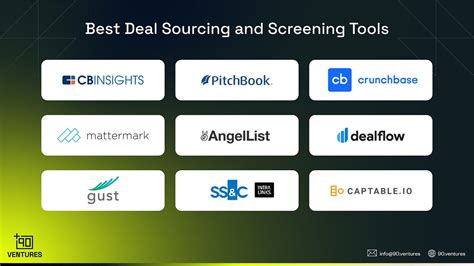As a Venture Capital (VC) firm, having the right tech stack is crucial to efficiently manage investments, streamline operations, and drive growth. With the increasing importance of data-driven decision-making, a well-curated tech stack can be a game-changer for VCs. In this article, we will explore the 7 essential tools that should be part of a VC's tech stack, enabling them to stay ahead of the curve.
Investment Management Platforms
Effective investment management is the backbone of any VC firm. A robust investment management platform is necessary to oversee the entire investment lifecycle, from deal sourcing to portfolio monitoring. These platforms provide a centralized hub for managing investment data, tracking performance metrics, and streamlining communication with portfolio companies.

Some popular investment management platforms for VCs include DealCloud, Dynamo, and eFront. These platforms offer features such as deal tracking, portfolio monitoring, and reporting, making it easier for VCs to manage their investments.
Data Analytics Tools
Data analytics tools are vital for VCs to gain insights into market trends, portfolio performance, and potential investment opportunities. These tools enable VCs to make data-driven decisions, identify patterns, and predict future outcomes. By leveraging data analytics, VCs can optimize their investment strategies and stay ahead of the competition.

Some popular data analytics tools for VCs include Tableau, Power BI, and D3.js. These tools offer features such as data visualization, predictive modeling, and machine learning, enabling VCs to uncover hidden insights and make informed decisions.
Portfolio Monitoring Software
Portfolio monitoring software is essential for VCs to track the performance of their portfolio companies. These software solutions provide real-time insights into key performance indicators (KPIs), enabling VCs to identify areas of improvement and make informed decisions. By leveraging portfolio monitoring software, VCs can optimize their portfolio management and drive growth.

Some popular portfolio monitoring software for VCs includes Carta, Gust, and Visible. These software solutions offer features such as KPI tracking, financial reporting, and collaboration tools, making it easier for VCs to manage their portfolios.
Communication and Collaboration Tools
Effective communication and collaboration are crucial for VCs to work efficiently with portfolio companies, investors, and other stakeholders. Communication and collaboration tools enable VCs to share information, track progress, and facilitate decision-making. By leveraging these tools, VCs can build stronger relationships and drive growth.

Some popular communication and collaboration tools for VCs include Slack, Microsoft Teams, and Notion. These tools offer features such as real-time messaging, file sharing, and project management, making it easier for VCs to communicate and collaborate with stakeholders.
Customer Relationship Management (CRM) Software
Customer relationship management (CRM) software is essential for VCs to manage relationships with portfolio companies, investors, and other stakeholders. CRM software provides a centralized hub for managing contact information, tracking interactions, and analyzing relationships. By leveraging CRM software, VCs can build stronger relationships and drive growth.

Some popular CRM software for VCs includes HubSpot, Salesforce, and Pipedrive. These software solutions offer features such as contact management, sales tracking, and marketing automation, making it easier for VCs to manage relationships and drive growth.
Artificial Intelligence (AI) and Machine Learning (ML) Tools
Artificial intelligence (AI) and machine learning (ML) tools are revolutionizing the VC industry by enabling firms to make data-driven decisions, identify patterns, and predict future outcomes. AI and ML tools can analyze large datasets, identify trends, and provide insights that can inform investment decisions.

Some popular AI and ML tools for VCs include Google Cloud AI, Microsoft Azure Machine Learning, and IBM Watson. These tools offer features such as predictive modeling, natural language processing, and computer vision, enabling VCs to gain insights and make informed decisions.






In conclusion, having the right tech stack is crucial for VC firms to efficiently manage investments, streamline operations, and drive growth. By incorporating these 7 essential tools into their tech stack, VCs can gain a competitive edge, make data-driven decisions, and drive success.
FAQ Section
What is a VC tech stack?
+A VC tech stack refers to the collection of software tools and technologies used by a venture capital firm to manage investments, streamline operations, and drive growth.
Why is a VC tech stack important?
+A VC tech stack is important because it enables firms to make data-driven decisions, streamline operations, and drive growth. It also helps firms to stay ahead of the competition and adapt to changing market trends.
What are some essential tools for a VC tech stack?
+Some essential tools for a VC tech stack include investment management platforms, data analytics tools, portfolio monitoring software, communication and collaboration tools, CRM software, AI and ML tools, and other software solutions that enable firms to manage investments and drive growth.
